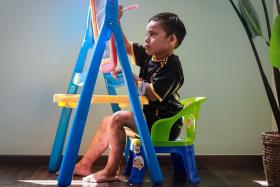Genetic eye condition patients get dedicated service at SNEC
Patients with hereditary eye conditions now have a dedicated service at the Singapore National Eye Centre (SNEC).
Established in October 2024 and the largest of its kind in South-east Asia, the Ocular Genetics Service (OGS) provides a centralised and specialised approach to diagnosing and managing inherited retinal and ocular conditions.
Patients were previously met with fragmented care, limited access to genetic testing, and a lack of integrated counselling, OGS clinical director Beau Fenner said. The care was also focused on managing symptoms without understanding the underlying genetic cause.
“Until routine and affordable genetic testing became available to us, many ocular conditions remained undiagnosed and patients were left wondering whether others in their family, including their children, would be similarly affected,” he said.
With genetic testing, patients now receive precise genetic diagnoses, enabling targeted interventions or participation in clinical trials. They will also receive genetic counselling, which offers clarity on inheritance patterns and implications for family members and future family planning.
By consolidating expertise in ophthalmology, genetics, and genetic counselling, OGS offers genetic diagnostic services and treatment plans tailored for each patient. It also connects Singapore to international efforts in studying rare genetic eye diseases.
This comes at a time when genetic eye diseases have become the primary cause of blindness among working-age adults in developed nations such as Singapore, SNEC told The Straits Times.
“Patients with monogenic eye conditions constitute well over 1,000 outpatient visits at SNEC annually, with more than 300 new families diagnosed each year,” it said. Monogenic conditions are caused by a single gene mutation.
Access to genetic testing brings with it several advantages - one being early diagnosis for young patients with potentially life-threatening multi-system conditions.
Retinal-renal syndrome, for instance, is a condition that initially causes vision loss in infancy. Affected patients are otherwise healthy until reaching adolescence, when they experience a rapid decline in kidney function and eventual kidney failure.
“Early genetic diagnosis has enabled our patients to be seen by kidney specialists years before they have kidney problems, enabling early management and slowing of the disease,” Dr Fenner said.
Genetic testing can also help identify relatives of patients who are at risk of having a condition.
This also means that people of child-bearing age with a high chance of passing a condition that can result in blindness on to their children may be able to use their genetic test results to reduce the risk to their offspring.
Dr Fenner said: “We collaborate with our colleagues from other hospitals such as the KK Women’s and Children’s Hospital for families looking to further explore reproductive options such as IVF with pre-implantation genetic testing and prenatal testing.”
To support newly diagnosed families, OGS provides genetic counselling services - where the condition, its inheritance pattern and implications for the family are explained.
Families are also connected to support groups and resources to help them navigate their journey, in addition to providing psychosocial support to address the emotional and practical challenges of managing a genetic condition.
New treatments for diseases that can lead to blindness and which are caused by genetic changes specific to and common in Singapore are also being developed at OGS. These, Dr Fenner said, can potentially restore normal sight in some conditions.
“This home-grown approach to therapy development is essential for rare genetic eye conditions because therapies that target genetic changes from other populations or ethnic groups may not be suitable for Singaporeans,” he explained.
Four-year-old Elliot Koh, who is being seen at OGS, was diagnosed with Leber congenital amaurosis (LAC) at only four months old and was already completely blind.
Despite it being a recessive genetic condition, Elliot’s family has no prior history of the disease. His parents said doctors later told them that there was no way the condition could have been detected while he was in the womb, nor would it have shown up in genetic tests then.
Though Elliot’s father Eric Koh was later identified to be a carrier of LAC, the gene his mother, Koh Wei Shi, carried had not yet been identified to be a carrier as well.
“Couples who do genetic testing are usually tested against a panel of common conditions, but this condition was too rare to be detected in a generic test,” explained Ms Koh.

After Elliot’s diagnosis, the couple underwent genetic counselling and were told that the probability of their offspring having LAC was 25 per cent and that the condition affects about one in 100,000 individuals.
Elliot is also a participant in a research programme on inherited retinal diseases which Dr Fenner is a part of.
Ms Koh said: “When you receive this diagnosis, the data is very sparse because of how rare this condition is. So we felt that if contributing to the research programme can help future generations, then of course (we will do it).
“Even if it doesn’t treat our child, it’s going to treat other children. At the same time - and I know that the likelihood is low - but if there really comes some form of treatment, at least we’re also in the database.”
She said she understood that the likelihood of a cure being developed soon is low, as companies may be less incentivised to research rarer diseases and focus instead on common conditions affecting more people.
But she said: “It may not help him, it may even not help his next generation. But if every single person does not want to (contribute to the research programme for) this reason, not want to add on to the data, then that really will never change anything.”
Get The New Paper on your phone with the free TNP app. Download from the Apple App Store or Google Play Store now


